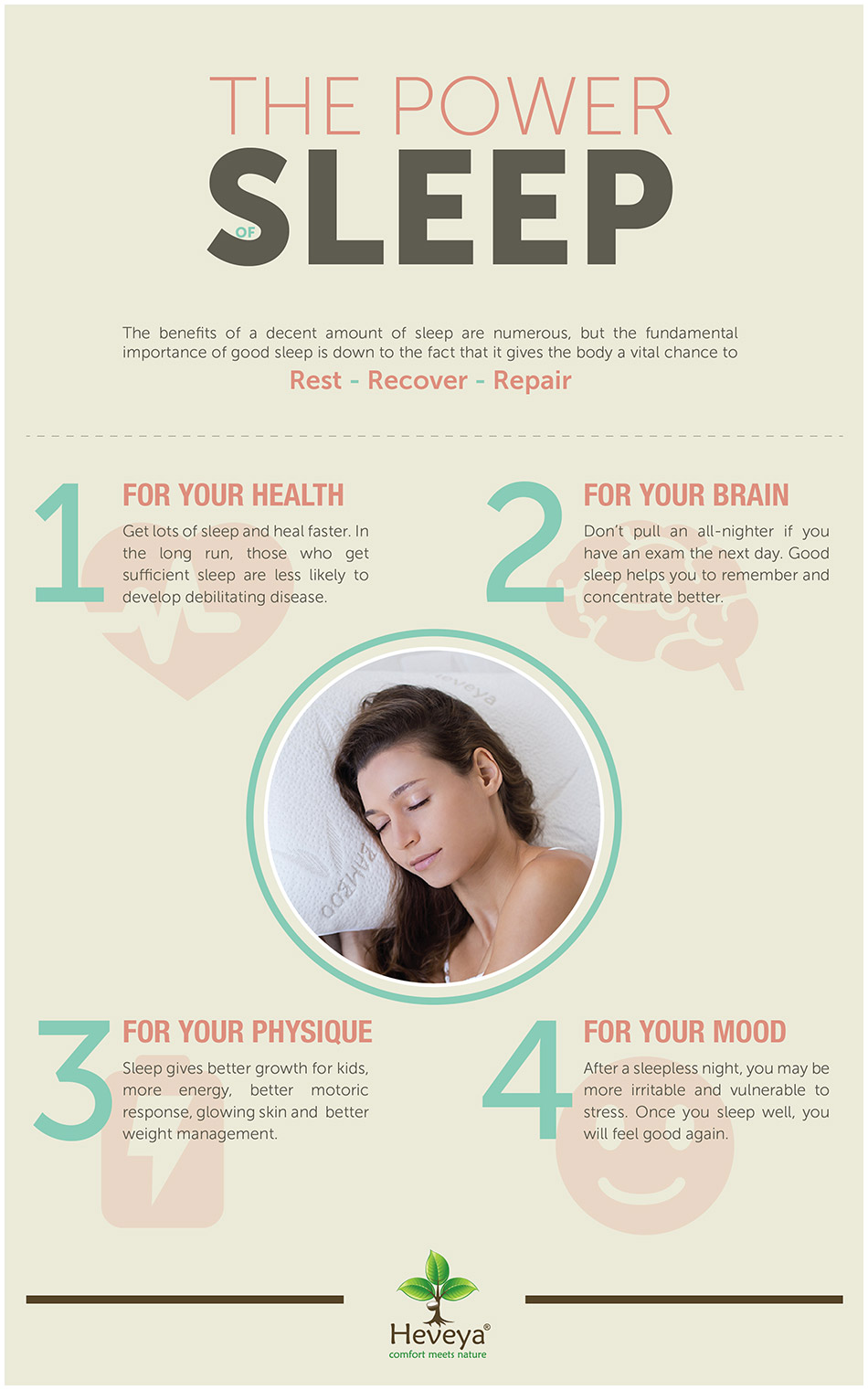The importance of getting a good night’s sleep
We often hear about the importance of getting 7-8 hours of good-quality sleep a night from doctors but why exactly is sleep so important? The benefits of a decent amount of sleep are numerous, but the fundamental importance of good sleep is down to the fact that it gives the body a vital chance to rest, recover and repair. During the Non-Rapid Eye Movement (NREM) state of sleep, energy is restored, blood supply to the muscles is increased and tissue growth and repair occurs.

Here we will show you some of the major health benefits of good sleep.
Reduced chance of health problems
There have been dozens of studies with convincing evidence of a correlation between sleep deprivation and health problems. In the long term, those who get insufficient sleep are more likely to develop a whole host of potentially debilitating diseases, such as heart disease, diabetes, and obesity.
Better immunity
If you get a cold, the fastest way to get rid of it is to sleep as much as you can. This is because sleep allows your body to focus on recovering and fighting off the virus. Studies show that those who sleep less than seven hours a night are more prone to catching a common cold. In fact, researchers from Carnegie Mellon University1 found that the risk of catching a cold is three times higher for those who sleep less than seven hours a night compared to those who sleep more than eight hours.
Better memory
We have all heard of ‘sleeping on it’ in order to solve a problem or come up with a solution for something, and scientists have proven that your brain continues to process your day’s events and tasks while you sleep. The same applies for memory: sleep can be seen as a kind of ‘back-up’, during which the brain reruns your day and transfers certain aspects of it to long-term memory. It follows that the longer and better-quality your sleep, the more opportunity you are giving your brain to take a break and process all the information you encountered during the day.
Better concentration
One ‘Slumber Survey’ by IKEA2 found that 73% of Australians said they were ‘sleep-deprived’, and how many times have you excused lack of motivation or work ethic by saying you didn’t sleep well the night before? More than half of us will have a hard time concentrating after a bad night’s sleep, according to a study by shopping channel QVC3, and so not only are there clear downsides to lack of sleep, but the benefits of sleeping for even a little longer than normal are conducive to an ability to concentrate better for the entire rest of the day.
Better weight management
People with insufficient sleep are more likely to develop weight problems because sleep deprivation creates cravings. Those who are low on sleep tend to crave starchy or sugary foods to provide the energy they need to stay awake, and this can inevitably lead to weight issues. On the contrary, if you are well rested, you will find it easier to stay energised with a balanced diet and will not experience the ‘fast-fix’ energy cravings, and will therefore find it easier to maintain a healthy weight. Furthermore, the bodily levels of the hormone leptin, which plays a key role in making you feel full, drop when you do not get enough sleep.

Better mood
Whilst getting plenty of sleep won’t eradicate bad days, nearly two thirds of people claim a disturbed night’s sleep as the cause of their irritability, according to the same QVC survey. The tiredness and lack of both physical and mental rest that sleep gives us is bound to impact on your judgement, problem-solving and creative abilities, and therefore a decent night’s sleep can have a positive impact on both you and those around you.
Better growth for kids
Sleep is extra important for children and adolescents. During the NREM period of sleep, important growth and development hormones are released. The Millpond Children’s Sleep Clinic4 recommends that young children get at least 10 hours sleep, whilst 14-16 year olds should get 9 hours of quality sleep in order for growth and repair of cells to occur.
Better motoric response
The Institute of Medicine estimates that one in five car accidents in the U.S. results from drowsy driving; about 1 million crashes a year. Naturally any accident is more likely when you are physically exhausted, says Jodi Mindell5 , a professor of psychology at St. Joseph’s University and author of Sleep Deprived No More, and therefore sleep can improve your reactions and coordination.
Look better
Sufficient sleep will reduce dark under eye circles and perk up your skin and complexion, giving you a positive glow compared to your sleep-deprived colleagues. The British Medical Journal published a study in 2010 where researchers took photos of 23 people both after a normal eight hour sleep and after a period of sleep deprivation. They asked 65 people to rate each photo based on health, attractiveness and fatigue. The results were unsurprising, as the sleep deprived were rated the worst in all three categories and, after all, it is hardly a compliment to be told ‘you look tired’.
The benefits of getting enough sleep are clear, and just an extra hour or two can make a world of difference, but time alone is not the only important factor. In order to reap the benefits of plentiful sleep, your sleep should be high-quality and mean you feel raring to go in the morning. If you want to improve the quality of your sleep, the best way is to improve your sleep hygiene. That means sleeping on a comfortable mattress that supports you in the best way possible and pillows that support your neck and back for the entire night. According to the Department of Health6, ‘sleep is as essential for good health as oxygen, food and water’, so make sure you invest in the right mattress for you.

References
- New research confirms lack of sleep connected to getting sick
http://www.cmu.edu/news/stories/archives/2015/august/sleep-and-sickness.html - Sleep census: Give us another hour’s sleep
http://www.news.com.au/national/sleep-census-give-us-another-hours-sleep/story-e6frfkvr-1226375682997 - The benefits of a good night’s sleep
http://www.bodyandsoul.com.au/health/health+advice/10+benefits+of+a+good+nights+sleep,17681 - How much sleep do kids need?
http://www.nhs.uk/Livewell/Childrenssleep/Pages/howmuchsleep.aspx

